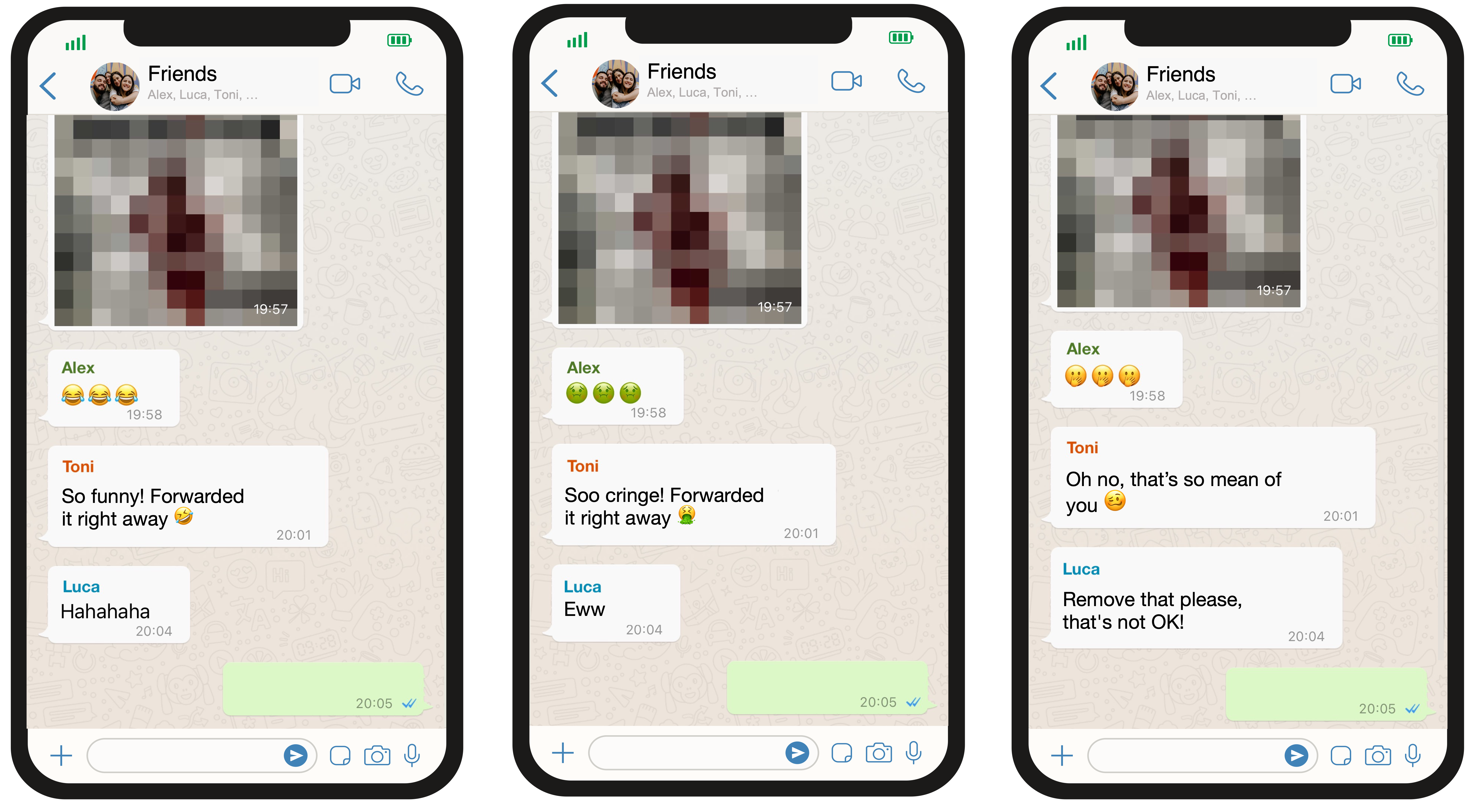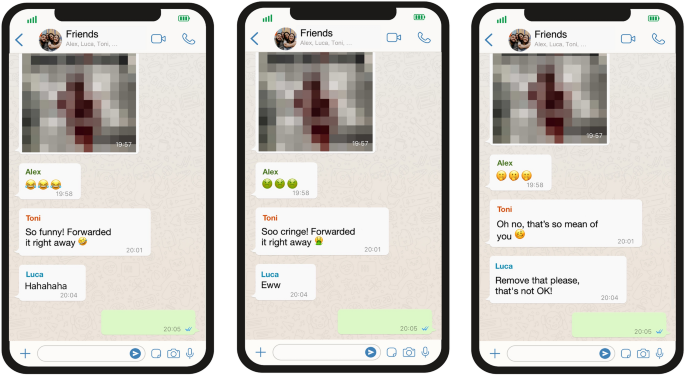“Soo cringe!” Aggressive group norms and conformity behavior in WhatsApp chats
Published in Social Sciences and Behavioural Sciences & Psychology

This research is part of the broader research project A-DigiKomp, which aimed to enhance digital competence and sovereignty among young people through a gamified approach.
Motivation and Background
The motivation for A-DigiKomp stemmed from the observation that, despite the common belief that young people acquire the necessary skills to navigate the internet by accident through their frequent use, numerous studies1,2 have shown a lack of in-depth understanding in this age group. This lack extends to both technical aspects (e.g., tracking, hacking) and social consequences (e.g., cyber-aggression, addictive behavior). Research by Kezer3 highlighted a vulnerability for private data protection, and further studies4–6 revealed significant differences in AYA’s knowledge and understanding of digital rights, obligations, and safeguards. These findings underscore the need for targeted educational interventions to increase various facets of digital competence7,8.
WhatsApp is ubiquitous in the lives of young people, with 89% of 16-29 year olds in Germany using the platform9,10. While it facilitates connectivity, it also poses risks such as cyber-aggression. Cyber-aggression can manifest itself through harmful behaviors such as sharing images without consent, impersonation, and derogatory comments11. These behaviors, while not always repetitive like cyberbullying, can have a significant impact on young people's well-being. Research shows that approximately 30% of young WhatsApp users report experiencing cyber-aggression12. Given these high prevalence rates, it is crucial to understand the factors that contribute to cyber-aggressive behavior.
Project Goals and Development
A-DigiKomp aimed to empower adolescents and young adults (AYA, 16-29 years) by developing digital competences and fostering a sense of sovereignty over their digital interactions. The project was a collaborative effort that resulted in the creation of a context-sensitive browser plug-in and an adaptive serious game. These tools were designed to promote digital competence skills, such as cyber-aggression and privacy, that are tailored to individual abilities and risks, while being engaging and motivating.
The development process was supported with scientific research on cognitive, social, and developmental factors that influence online behavior. We also incorporated feedback and ideas from focus groups and a game jam organized to ensure that the tools and content were relevant and appealing to the AYA age group4,5. In addition, an empirically based digital literacy questionnaire was developed and validated to classify users into different digital competence profiles. This enabled the creation of personalized learning environments within the serious game, thus increasing the educational impact.
Vignette Studies: Investigating Digital Behavior
To better understand the digital behaviors of AYAs, we conducted vignette-based studies focusing on 1) privacy and 2) cybersecurity decisions as well as 3) cyber piracy, and 4) cyber-aggression in the digital space.
The effect of aggressive group norms on young adults’ conformity behavior in WhatsApp chats: a vignette-based experiment
The cyber-aggression study employed a vignette-based online approach to examine the influence of aggressive group norms on conformity behavior in WhatsApp group chats among AYA. Participants (M = 22.28, SD = 2.55 years) were presented with three vignettes, each depicting a WhatsApp group chat screenshot where a photo of an outsider was shared without consent (see Figure 1). The group members' reactions varied (funny, aggressive, friendly), and group type (friends vs. fellow students) was manipulated. Participants estimated the number of their close friends who would respond in specific ways (emoticons, comments), serving as the dependent variable. Data from 500 participants were analyzed, focusing on the experimental varied factors, sociodemographic and developmental-psychological influences. The statistical analysis utilized a 2x3 factorial design and multilevel logistic regression to assess the impact of group norms and other confounding variables on expected cyber-aggressive behavior.

Figure 1. Examples of WhatsApp vignette scenarios with different group norms.
Key Findings and Implications
Our study on cyber-aggression yielded several key findings:
- Social Norms: Aggressive group norms significantly predicted the expected cyber-aggressive reactions. Participants were more likely to expect their friends to conform to aggressive norms if they already saw aggressive message and emoticons in their WhatsApp group chats.
- Group Context: The WhatsApp group type (friends vs. classmates) did not affect expectations of cyber-aggressive behavior. Instead, friends group size and group vivacity influenced these expectations. Participants who perceived their friend groups as larger and expected more lively exchanges in their WhatsApp groups also expected more aggressive behavior.
- Demographic Influences: Younger participants under the age of 21 and males were more likely to anticipate cyber-aggressive reactions.
Overall, our results indicate the importance of social dynamics, particularly group norms, in anticipating aggressive tendencies in WhatsApp groups. Although experimental effects may be smaller than real-life situations, our results show that group norms may be crucial in predicting and preventing cyber-aggression. Altering these norms could reduce cyber-aggressive tendencies and increase prosocial actions and netiquette13.
These findings were incorporated into the serious game to promote digital competent behavior in A-DigiKomp.
Future Research and Considerations
While our study has made significant strides in understanding cyber-aggression in WhatsApp chats, several areas warrant further exploration:
- Real-Life Contexts: Future studies should move beyond controlled experimental settings to explore how group norms influence cyber-aggression in everyday situations. Investigating real-life scenarios will provide a more accurate understanding of the complex nature of group dynamics and individual reactions, leading to more applicable findings.
- Detailed Measurement Approaches: Future studies should employ more detailed measurement and data analysis techniques to capture the nuanced behaviors associated with cyber-aggression. By moving beyond binary formats, researchers can gain a deeper understanding of the range and severity of cyber-aggressive actions and reactions.
- Generalizability and Cultural Contexts: While our study had a relatively large sample size, future research should aim to include participants from varied educational, cultural, and social backgrounds to enhance the generalizability of the findings.
Conclusion
Our research on the impact of group norms on cyber-aggression in WhatsApp chats highlights the importance of social dynamics in digital behavior. By understanding these influences, we can develop more effective interventions to promote healthier digital interactions among young people. The A-DigiKomp project represents a significant step forward in this effort, providing valuable tools and insights to enhance digital competence and sovereignty. Continued research and collaboration are crucial to ensure that young individuals are equipped to navigate the digital world safely and confidently.
References
- Bogdanovskaya, I., Koroleva, N. & Uglova, A. Digital competence and information security in adolescents. Digital competence and information security in adolescents vol. 2630 63–72 (2020).
- Soldatova, G. U. & Rasskazova, E. I. The dark side of digital competence of Russian adolescents: Illusion of competence & risky behavior online. Vopr. Psikhologii 3–15 (2017).
- Kezer, M., Sevi, B., Cemalcilar, Z. & Baruh, L. Age differences in privacy attitudes, literacy and privacy management on Facebook. Cyberpsychology J. Psychosoc. Res. Cyberspace 10, https://doi.org/10.5817/CP2016-1-2 (2016).
- Kreuder, A., Frick, V., Schlittmeier, S. J. & Frick, U. Game jamming as a participatory design approach to foster adolescents’ digital competence: Game Jamming als partizipativer Designansatz zur Förderung der digitalen Kompetenzen Adoleszenter. Proceedings of Mensch und Computer 2023 472–476 https://doi.org/10.1145/3603555.3608568 (ACM, 2023).
- Kreuder, A., Haehn, L., Klütsch, J., Schlittmeier, S. J. & Frick, U. "Cookies? I don’t even know what that is. " - Online focus groups on adolescents’ experience and behavior in the digital space: „Cookies? Ich weiß nicht mal, was das ist.“ – Online-Fokusgruppen zum Erleben und Verhalten von Adoleszenten im digitalen Raum. Proceedings of Mensch und Computer 2023 498–502 https://doi.org/10.1145/3603555.3608570 (ACM, 2023).
- Kreuder, A., Frick, U., Rakoczy, K. & Schlittmeier, S. J. Digital competence in adolescents and young adults: a critical analysis of concomitant variables, methodologies and intervention strategies. Humanit. Soc. Sci. Commun. 11, 48 https://doi.org/10.1057/s41599-023-02501-4 (2024).
- Sánchez-Caballé, A., Gisbert-Cervera, M. & Esteve-Mon, F. The digital competence of university students: a systematic literature review. Aloma Rev. Psicol. Ciènc. Educ. Esport 38, 63–74 https://doi.org/10.51698/aloma.2020.38.1.63-74 (2020).
- Zhao, Y., Pinto Llorente, A. M. & Sánchez Gómez, M. C. Digital competence in higher education research: A systematic literature review. Comput. Educ. 168, 104212 https://doi.org/10.1016/j.compedu.2021.104212 (2021).
- Dixon, S. J. Most popular messaging apps 2024. Statista https://www.statista.com/statistics/258749/most-popular-global-mobile-messenger-apps/ (2024).
- Faktenkontor. Anteil der befragten Internetnutzer, die WhatsApp nutzen, nach Altersgruppen in Deutschland im Jahr 2021/22 [Graph]. Statista https://de.statista.com/statistik/daten/studie/691572/umfrage/anteil-der-nutzer-von-whatsapp-nach-alter-in-deutschland/ (2022).
- Nocentini, A. et al. Cyberbullying: Labels, Behaviours and Definition in Three European Countries. J. Psychol. Couns. Sch. 20, 129–142 https://doi.org/10.1375/ajgc.20.2.129 (2010).
- Aizenkot, D. & Kashy-Rosenbaum, G. Cyberbullying in WhatsApp classmates’ groups: Evaluation of an intervention program implemented in Israeli elementary and middle schools. New Media Soc. 20, 4709–4727 https://doi.org/10.1177/1461444818782702 (2018).
- Pinho, A. da S., Molleman, L., Braams, B. R. & van den Bos, W. Majority and popularity effects on norm formation in adolescence. Sci. Rep. 11, 12884 https://doi.org/10.1038/s41598-021-92482-8 (2021).
Follow the Topic
-
Scientific Reports

An open access journal publishing original research from across all areas of the natural sciences, psychology, medicine and engineering.
Related Collections
With Collections, you can get published faster and increase your visibility.
Reproductive Health
Publishing Model: Hybrid
Deadline: Mar 30, 2026
Obesity
Publishing Model: Hybrid
Deadline: Apr 24, 2026




Please sign in or register for FREE
If you are a registered user on Research Communities by Springer Nature, please sign in